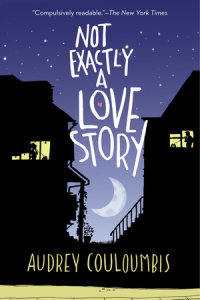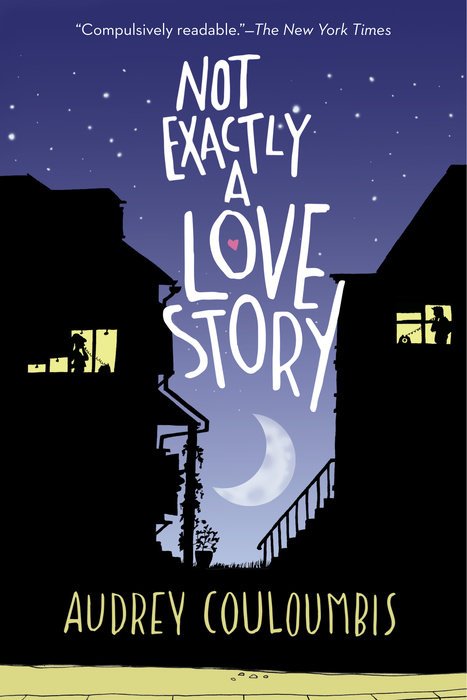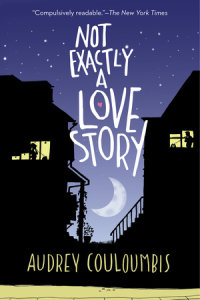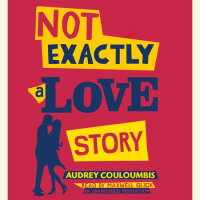Not Exactly a Love Story
“A fifteen-year-old creates an alter ego to woo his dream girl. Compulsively readable.” —The New York Times
This quirky, flirty, and smart story will appeal to fans of Frank Portman’s King Dork, John Green’s An Abundance of Katherines, and Rainbow Rowell’s Eleanor and Park. It’s not exactly a love story . . . but it’s pretty close.
It’s 1977. Fifteen-year-old Vinnie is recovering from the worst case of acne his dermatologist’s ever seen. His girl moved to California without saying good-bye. And the ink on his parents’ divorce papers is barely dry when his mom announces they’re moving from Queens to Long Island. The silver lining? Moving next door to Patsy, everyone’s dream girl. Not that she’d ever notice him. But when Vinnie calls Patsy one night, it leads to a chain of anonymous midnight conversations, and the two develop a surprisingly strong connection despite the lies it’s built on. But as Vinnie gets to know Patsy in real life, it’s clear that both identities can’t survive. . . .
An Excerpt fromNot Exactly a Love Story
One
On my fifteenth birthday, January 16, 1977, I slogged through a New York City rainstorm of hurricane proportions to buy the Sunday paper.
Actually, several newspapers, including those from Chicago and Houston. I didn’t get the California papers. If I’d been born at the same moment on the West Coast, with the three-hour time difference, I’d have been born yesterday. Plus, the rain had already reduced the California paper to papier-mache.
I’m a Capricorn, the sign represented by a goat with a fish’s tail. Altogether, five horoscopes told me these things:
--I would suffer a disaster that would lead to a major discovery about myself. Good, with reservations.
--I would make a career move. We-ell.
--I would have an opportunity to see more of the country. Um, good.
--I would find romance. Good, but at the time, I felt I had romance. I decided this meant my interest would be reciprocated.
--I would learn that some kinds of long-term relationships are irreplaceable. My God. My mom. Or my dad? Maybe just a grandparent.
Just?
Two
My dog died.
I grant you, she was a pretty old dog. Her health had been poor for some time, and it came as no surprise when she just didn’t wake up one morning. It’s what old dogs do, after all. But that didn’t make it any easier to accept.
Dad called the vet so we’d have someplace to take her. Mom went to work, worrying she’d be late, but Dad and I sort of took the day. We sat with my dog curled up between us on the couch, right where she’d died, and remembered all her best stuff.
On the way back home, Dad asked if I wanted another dog. I said no. She’d been my dog for fourteen years, she was irreplaceable.
A few days later, I bought a Valentine’s Day card for my girl--or at least the girl I’d been very fond of for two years--and slipped it into the vent in her locker. I signed it “Anonymous Admirer.” I had an idea that would be more interesting than getting a signed card.
I’d planned to ask her to the movies or maybe a museum, and I’d say something witty about anonymous admirers so she’d know that card came from me. Mainly, I wanted to stand out a little from the crowd. I’d take her to a school dance for our second date, where I figured I would really shine.
She didn’t show up for math class, and then she didn’t show up in the cafeteria. Somebody told me she’d moved away over the weekend. Without saying a word to me. Not even good-bye.
Of course, it’s true that I never told her that I thought of her as my girl. And she did leave several other admirers behind. I could see that she might not feel obligated.
Only a week later, my parents called me to the dining room table for a family conference. Not an unusual occurrence in itself. I’d been neglecting to take the garbage out. I had a pile of laundry in one corner of my room.
“Your dad and I--we have something sad to tell you. We’ve decided to divorce.”
“Divorce?”
Dad’s eyes looked like deep wounds in a quivering heart. Pleading for its life.
“We’ve grown apart,” Mom said. “We’re still very fond of each other, of course.”
Tears filled Dad’s eyes and shimmered there on the brink of his eyelashes, but he never let them trickle pathetically down his face.
“We know you’re old enough to understand how this could happen,” Mom said.
Dad nodded.
“The divorce will be amicable,” Mom said. “We’ll try to work things out so that your life changes as little as possible. In those interests, your dad will find another place to live as soon as he is able.”
Dad nodded amicably.
Mom mumbled something about work to do and retired to the bedroom. Dad looked at me and I shrugged. A shrug that said I found all of this pretty awful but I was handling it. What good is it to be fifteen with everyone calling you a young man if you can’t handle something?
I woke up the next morning to a case of galloping acne.
Yeah, yeah, I know. Everybody has a few pimples. A few pimples is what I went to bed with. By morning the number of blotches had doubled, and by the time I got home from school I had weeping pustular eruptions. That’s what the dermatologist called them.
“Gold! What’s happened to you?”
I shrugged.
He wore goggles and a surgical mask during the appointment. If not for the rubber gloves, I’d’ve thought he was going snorkeling.
“Worst case I’ve ever seen,” he said, looking like I might be contagious. He said he’d leave a prescription at the front desk and quickly left the exam room.
Three
Cultural differences. My mother told me this was the reason for the divorce. That’s not to be read as religious differences. My dad grew up with a Hanukkah bush twinkling in the corner of the living room while the menorah was being lit, and baskets of chocolate from the Passover Bunny. As for Mom, the more candles, the better.
It can’t be read as a personality conflict either. Having an insider’s view of both a Jewish and an Italian family, I can reliably state that in the face of overwhelming happiness or unbearable sorrow, their reactions are clinically identical.
Further, my mother and father agree on all the important issues: which political candidate deserves their vote, child-rearing, women’s rights, and whether the toilet paper sheets should come from under or over the top of the roll. And they agreed on my name: Vincenzo. So what, you ask, would they find to fight about?
The root of all differences. Money.
Dad is an actor, and consequently doesn’t make it very regularly. He took on the role of househusband. He’s like Mary Poppins with a strong dose of that dog from Peter Pan, all wrapped up into one tall, thin, neurotic-looking individual in glasses that are too large for his face. But he doesn’t have a neurotic bone in his body. He doesn’t even have a lot of anger that his talent hasn’t been recognized.
Mom breadwinningly brings home the bacon as a stock market consultant. She saw to it that I took swimming lessons Saturday mornings at the Lexington Avenue Y. That I wore braces when my front teeth wanted to overlap. That we all took ballroom dancing when the trend swept New York City, for Pete’s sake!
Mom was behind this, I just knew it.
She dragged me along on a weekend shopping trip. My role: to carry the bags. “I’ve been thinking about you and Dad,” I said as we crossed the street.
“I can’t hear you over the traffic, Vinnie.”
She stepped up her pace, and I matched my stride to hers.
“Dad doesn’t seem to be into this divorce thing, Mom!” I shouted as she whipped through a revolving door. Mom shopped at the speed of light.
“It’s upsetting him,” I said a little too loudly as I saved our bags from the accelerating door, then hurried to catch up to her. It’s embarrassing to lose track of your mother in a store at my age.
“Of course he’s upset,” she said, climbing the escalator like a flight of stairs. “I’m upset.”
I saw that I was going about this all wrong. When I was a little kid, I got my finger pinched in a car door and the tip of it swelled to the size of a Ping-Pong ball. I was still blubbering about it when we got home an hour later, and when Dad asked what was wrong, Mom said I was “upset.” It’s better to appeal to Mom’s softer side with logic.
“I know divorce is upsetting, Mom,” I said. “My point is, Dad seems to be upset because he doesn’t want one.”
“I’m not asking for a divorce the way I’d ask for a microwave oven, Vinnie,” Mom said, stepping up her speed a couple of notches as she headed across the floor. I hitched up the shopping bags and followed her at a dogtrot as she said, “I need to move on.”
“Move on?” I figured she was trying to sound hip. “You want to live in Paris or Rome?”
“I’m saying I need to improve my life.”
“We’ll get you a Jacuzzi. How does divorce improve your life?”
She said, “I want to live my life, not just work my way through it. There’s mystery out there, romance. I want to feel taken care of--”
Romance?
“Taken care of?” I cried as we hurtled through the cruisewear department. “You mean by a man?” I said.
“Not kept, Vinnie,” my mother said to me and to whomever else might be listening as she snatched outfits off the clearance rack. “Taken care of. There’s a lot I’ve been missing.”
“You’re not going to get married to somebody else, right?”
“Being married is not my problem--”
This was good news. “I think you ought to talk this over with Dad. You don’t need a divorce--”
“Let me decide what I need, please.”
“All I’m saying--”
“Don’t say any more.” Mom disappeared into the fitting room.
Four
I thought when a marriage was over it caused a kind of explosion. I expected a lot of yelling and door-slamming. Tears and recriminations. But all that really happened was, I stopped bringing friends home. I hung out a lot in front of the TV. Dad started looking for a regular job and an apartment.
Even as the days grew longer, the sunshine warmer, and everyone I looked at appeared to be walking with a lighter step, a sense of things coming to an end hung over us at home. We spoke in sober, hushed tones and acted way too considerate. Divorce was just the next step this family was taking.
I got home from school at the end of March to find Dad in the kitchen. This was usual enough--Mom wasn’t much of a cook. Dad and I love cooking, and I always helped with dinner. But there weren’t any onions frying, and there was no smell of meat browning. No vegetables laid out on the counter. Not a good sign.
“Hi, Dad.”
“ ’Lo, Vinnie.” He was sort of hanging out in front of the refrigerator, whistling a shaky rendition of “Bridge Over Troubled Water.” I got the feeling he was hiding.
My stomach started tying itself up in knots. “You always tell me not to stand in the refrigerator.”
He shut the fridge. He’d been crying. “Dad--”
“It just hit me, I guess. Really hit me. I found a place.”
I swallowed hard. He’d be living someplace else. I couldn’t even imagine what that would be like for him.
He said, “It won’t be so bad. I have roommates. And I got a job.”
Roommates. Well, okay, at least he wouldn’t be living alone. “What kind of job?”
“Taxi driver. I can work late afternoons and in the evenings, leave myself time to do rounds in the morning. A lot of actors drive taxis.”
“I didn’t know you could drive.”
“Sure I can. But who needs to drive in New York?”
In a weird way, I could see this could be a good move for Dad. Not that I was enthusiastic about it. We ate cereal and left the bowls in the sink. I helped Dad pack his stuff and saw him off.
Mom was late getting home, and when she did, she seemed to have lost her footing. As if her new status loomed larger and somewhat too free for her tastes. Her discomfort was something I felt compelled to test. “So what kind of guy have you got in mind, Mom?”
“Don’t start,” she said. She was cleaning up the kitchen, something that was usually not on her radar.
“The professorial type,” I suggested as she put an open box of uncooked rice into the fridge. “No, not enough income. An advertising executive, a little older, maybe, and moving in faster circles--”
“Vinnie, leave me alone.” She wedged a tall cereal box into a cabinet full of pots and pans. “What time is it?” The batteries in the kitchen clock had been dead for days. “Do you have the time?”
My mother took a plane to Haiti. She was back in three days with a light tan, a supply of grass place mats, and a piece of official-looking paper that ended my parents’ marriage.
Mom hooked up with a circle of girlfriends after she got home. Singles and divorcees. All of them compact--in build, in mannerism, in personality. No waste. Mom got stronger, sharper around the edges, humorless, even. It was scary.
Schedules and chores were printed on a chart that hung in the dining room over Dad’s place now that Dad wasn’t present to act as a receptacle for appointments, plans, requests, etceteras. After a couple of failed tests and then a warning note from my guidance counselor, Mom made me hit the books hard.
She was aiming for straight As. I was looking to pass. When third-quarter report cards came out, I stared at the print until it shimmered like water had spilled on the page. I had skated by with Bs and a C except for one real shocker.
Failing gym had never even occurred to me.
I couldn’t seem to recover from one blow before another followed. No one tells you how things really are. Everything coming in waves, one rolling in after the other, and in case you’re thinking that doesn’t sound so bad, keep this in mind: that’s how huge rocks, boulders, become sand on the beach.
Five
Mom did the required school conference. She could say Mr. Buonofuoco’s name with a straight face, despite the fact that I’d already told her he’d been dubbed Mr. Goodfuck. No one claimed to have any firsthand experience. His nickname was the student body’s revenge for enduring his boot camp–level gym classes.
In class, I played it cool, saying to anyone who asked about it, “Good thing I don’t plan to major in gym in college.” Laughter all around. I didn’t think it was funny. Or cool. I was flunking phys ed, flunking gym!
I had to talk to Dad about this. It was his busy time, the weekend. But I couldn’t wait for our regular Tuesday-night supper. I was sitting with him about two hours later.
“Dad, can you afford this?” I asked as we parked ourselves in an Italian pastry shop. A waitress came up to stand at Dad’s elbow.
“Are you ready to order?” she asked. She was a knockout, and I noticed Dad noticed. Big dark sparkling eyes in a pretty face, lush in all the places that counted. Classy-looking, too. A guy could wonder what she was doing waiting tables when Hollywood was only a few thousand miles away. We ordered cannoli.
“I can afford it, I just did a dog food commercial,” Dad said when the waitress had gone. He looked a little embarrassed. “It’s not a speaking part, the dog got that part.”



